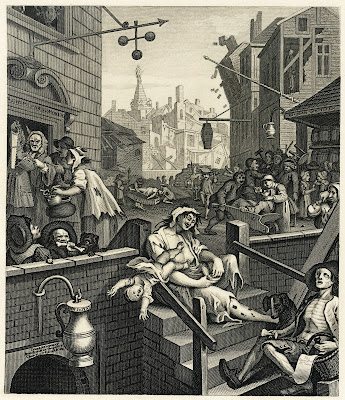 |
| The Singing Beggars by Russian painter Ivan Yermenyov c. 1775 |
The beggar had reached the goal of peaceful happiness while Augustine's ambition was causing him pain and trouble
 |
| A beggar in 1880s Tehran, photographed by Antoin Sevruguin |
My misery was complete and I remember how, one day, you (God) made me realize how utterly wretched I was. I was preparing a speech in praise of the Emperor, intending that it should include a great many lies which would certainly be applauded by an audience who knew well enough how far from the truth they were. I was greatly preoccupied by this task and my mind was feverishly busy with its harassing problems. As I walked along one of the streets in Milan I noticed a poor beggar who must, I suppose, have had his fill of food and drink, since he was laughing and joking. Sadly I turned to my companions and spoke to them of all the pain and trouble which is caused by our own folly. My ambitions had placed a load of misery on my shoulders and the further I carried it the heavier it became, but the only purpose of all the efforts we made was to reach the goal of peaceful happiness. This beggar had already reached it ahead of us, and perhaps we should never reach it at all. For by all my laborious contriving and intricate manoeuvres I was hoping to win the joy of worldly happiness, the very thing which this man had already secured at the cost of the few pence which he had begged.
The beggar was cheerful and had no worries while Augustine was unhappy and full of apprehension
 |
| Homeless man in Anchorage, Alaska. |
Of course, his was not true happiness. But the state of felicity which I aimed to reach was still more false. He, at any rate, was cheerful, while I was unhappy: he had no worries, but I was full of apprehension. And if anyone had asked me whether I would rather be happy or afraid, I should have replied that I preferred to be happy. But if I had then been asked to choose between the life which that beggar led and my own, I should have chosen my own life, full of fears and worries though it was. This would have been an illogical choice and how could I have pretended that it was the right one? For I ought not to have preferred myself to the beggar simply because I was the more learned, since my learning was no source of happiness to me. I only made use of it to try to please others, and I only tried to please them, not to teach them. This was why you broke my bones with the rod of your discipline.
Looking for happiness in honour instead of honour in God is not true honour
 |
| Sleeping homeless person in the corner of Cologne Cathedral, Germany, 2010 |
My soul, then, must beware of those who say that what matters is the reason why a man is happy. They will say that it was drunkenness that made the beggar happy, while my soul looked for happiness in honour. But what sort of honour did it hope to find? Not the kind which is to be found in you. O Lord. It was not true honour, any more than the beggar's joy was true joy, but it turned my head even more. That very night the beggar would sleep off his drunkenness, but mine had been with me night after night as I slept and was still with me in the morning when I woke, and would still be with me night and day after that.
The beggar was happier than Augustine. The beggar was cheerful while Augustine was anxious. The beggar earned his wine by wishing people good day while Augustine fed his pride by telling lies
 |
| A man holding a sign using self-deprecating humor for begging |
Yet I know that it does matter why a man is happy. There is a world of difference between the joy of hope that comes from faith and the shallow happiness that I was looking for. There was a difference too between the beggar and myself. He was certainly the happier man, not only because he was flushed with cheerfulness while I was eaten away with anxiety, but also because he had earned his wine by wishing good day to passers-by while I was trying to feed my pride by telling lies.
 |
| William Hogarth's Gin Lane, 1751 |
On this occasion I told my friends much of what I felt about these things. Often, by observing them, I was made aware of my own state, and I was not pleased with what I saw. This made me sad and my misery was redoubled; and if, by chance, fortune smiled upon me, I was too disheartened to seize it, for it would take to flight just as my hand was ready to close upon it.
Source: Saint Augustine. Confessions. Translated by R.S. Pine-Coffin. London: Penguin Group, 1961, Book VI, pages 118-120.




No comments:
Post a Comment